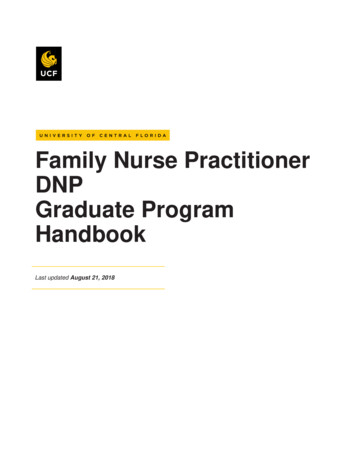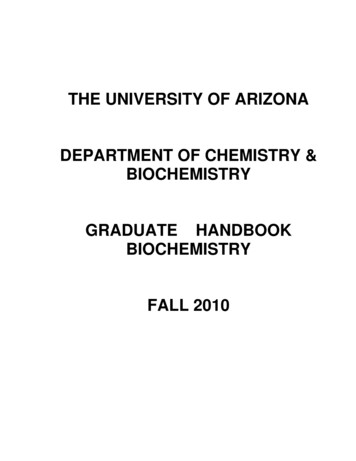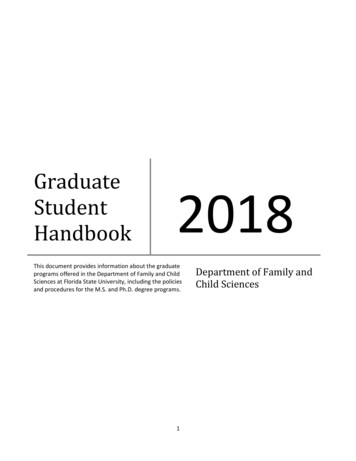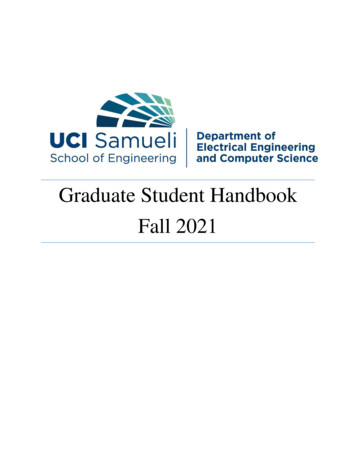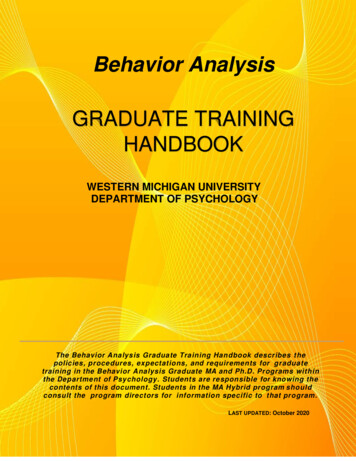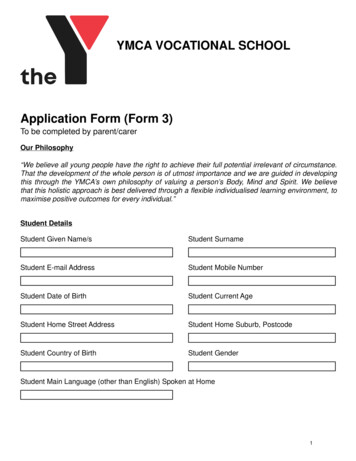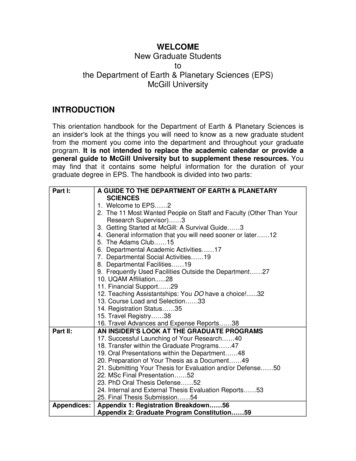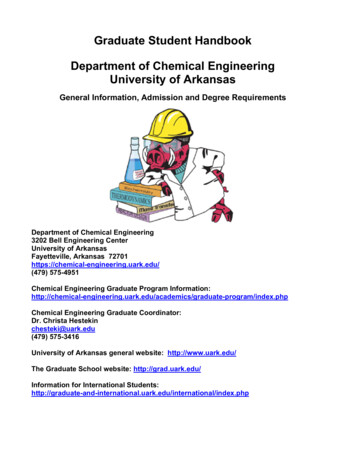
Transcription
Graduate Student HandbookDepartment of Chemical EngineeringUniversity of ArkansasGeneral Information, Admission and Degree RequirementsDepartment of Chemical Engineering3202 Bell Engineering CenterUniversity of ArkansasFayetteville, Arkansas 72701https://chemical-engineering.uark.edu/(479) 575-4951Chemical Engineering Graduate Program cademics/graduate-program/index.phpChemical Engineering Graduate Coordinator:Dr. Christa Hestekinchesteki@uark.edu(479) 575-3416University of Arkansas general website: http://www.uark.edu/The Graduate School website: http://grad.uark.edu/Information for International u/international/index.php
TABLE OF CONTENTSADMISSION . 1Admission Requirements . 1Application Procedure for a Non-Thesis MS . 1Application Procedure for a Thesis MS or a PhD . 1FINANCIAL AID . 2Teaching Assistantships and Research Assistantships . 2Walton Fellowships . 2Procedure for Applying for Financial Aid . 3Employment Outside of the Department . 3Conditions for PhD Funding . 3COURSEWORK . 4Course Designations . 4Grad Course Checklist: PhD . 5Grad Course Checklist: Thesis MS . 6Grad Course Checklist: Non-Thesis MS . 7Coursework Loads . 8Extra Coursework . 8RESEARCH PROJECTS . 9Thesis and Dissertation Preparation . 9GETTING YOUR DEGREE . 10Coursework . 10Research . 10Proposal to the Student’s Committee. 10Safety Practices . 11Assisting in Undergraduate Teaching . 11Forms for the Graduate School . 11Acceptable Progress Toward the Degree . 12Annual Progress Evaluation . 12DEGREE REQUIREMENTS FOR THE PhD . 13Getting an MS on the Way to a PhD . 13Checklist for the PhD. 13DEGREE REQUIREMENTS FOR THE THESIS MS . 15Checklist for the Thesis MS. 15DEGREE REQUIREMENTS FOR THE NON-THESIS MS . 16GETTING INTO THE PROGRAM WITHOUT A CHEMICAL ENGINEERING DEGREE . 17ASSESSMENT AT PHD PROPOSAL, MS THESIS, AND PHD DEFENSE . .20LABORATORY CHECKOUT PROCEDURES FOR DEPARTING RESEARCHERS . .21
Grad Student Handbook, Dept. of Chemical Engineering, Univ. of ArkansasADMISSIONThe following procedures are for applicants wishing to enter the graduate program in chemical engineering thatalready have a BS or an MS degree in chemical engineering. Applicants that do not have a chemicalengineering degree should skip to p. 17 of this document to the section “Getting Into the GraduateProgram if Without a Chemical Engineering Degree”.There are three types of graduate Chemical Engineering degrees offered: a non-thesis MS, a thesis-based MSand a PhD. The non-thesis MS has a different application procedure from the two research-based degrees.Also, there is no funding available for the non-thesis MS, you must pay your own tuition and living expenses.Admission RequirementsThe admission requirements are: A grade point average of 3.0 out of 4.0 earned in a BS chemical engineering degree, to becompleted before you start grad school here. If your previous school uses a grade scale not basedon 4.0, we will convert your grades to a 4.0 scale. A minimum GRE score with at least 155 on the quantitative portion and quantitative plus verbalscore of at least 307. The exam score counted for admission must have been taken within fiveyears prior to application. We have to have an official score from the ETS, so tell them to sendthem your GRE score directly to the University of Arkansas at Fayetteville, institution code 6866,dept code 1001. If you do not have a bachelor’s degree from a U.S. university, you’ll need a minimum score on oneof the following English proficiency exams:TOEFL paper exam: 550TOEFL internet based: 79PTE-A: 58IELTS: 6.5The test must have been taken within two years prior to application.For more details on English proficiency requirements: tudies/english-proficiency.phpApplication Procedure for a Non-Thesis MSContact Dr. Hestekin at chesteki@uark.edu to apply. The deadline for domestic students to apply to enter inthe Fall semester is July 1 and for the Spring semester, Dec 1. For international students it is April 1 for Fallsemester and Oct 1 for Spring semester, since they will need to obtain a visa. The priority dealing for fundingfor the Fall semester is January 15 and September 15 for the Spring semester.Application Procedure for a Thesis MS or a PhDTo enter the research-based graduate program you must first submit a complete application to the graduateschool: https://applygsie.uark.edu/apply/. When the complete application is received, you are then consideredfor acceptance into the Chemical Engineering Department.You can view the department faculty’s research areas ndex.phpThe complete application consists of a resume containing all required information, a statement of purpose,transcripts from all undergraduate and graduate institutions attended, and two letters of reference. Contact Dr.Hestekin at chesteki@uark.edu to obtain a list of the information required and complete instructions on theapplication requirements. The deadline for domestic students to apply to enter in the Fall semester is July 1and for the Spring semester, Dec 1. For international students it is April 1 for Fall semester and Oct 1 for Springsemester, since they will need to obtain a visa.1
Grad Student Handbook, Dept. of Chemical Engineering, Univ. of ArkansasFINANCIAL AIDTeaching Assistantships and Research AssistantshipsFinancial aid typically comes in the form of a graduate assistantship which can be in two different types: teachingassistantship or research assistantship. Typically, students are supported on a departmentally funded teachingassistantship for the first semester. During this semester they are required to find a research mentor forcontinued funding in the remaining semesters. The assistantship pays all tuition and provides a living stipendpaid monthly directly to the student. The yearly stipend for MS students is 18,300 and for PhD students is 23,600.The student pays university fees that cannot be covered by either a TA or an RA. The following website is agood resource for estimating the expenses of attending graduate /graduate/costs-and-funding/index.phpNote: strong preference in funding is given to PhD students over MS students. There is no financial aid availablefor the non-thesis MS program.According to 1987 changes in the tax laws, all assistantships and fellowships are considered to be taxableincome, but the tax rates are very low for these amounts. For more information see: http://graduate-andinternational.uark.edu/ lton FellowshipsThere are two rather large graduate fellowships available primarily to U.S. students, but a few internationalstudents have received it as well:Doctoral Academy Fellowships (DAF) - 12,000 per year added to base stipend plus tuition forup to 4 yearsDistinguished Doctoral Fellowships (DDF), 22,000 per year added to base stipend plus tuitionfor up to 4 yearsDetails about the deadline and requirements for these fellowships can be found at the following phpIt is important to note that neither fellowship pays university fees. A DAF may still be awarded at any time butit is still best to apply by the priority deadline. However, both fellowships must be applied for before startingon the University of Arkansas campus. The department is required to nominate you for these fellowshope(i.e. you cannot apply for them on your own). Therefore, you can email Dr. Hestekin (chesteki@uark.edu) formore details.2
Grad Student Handbook, Dept. of Chemical Engineering, Univ. of ArkansasProcedure for Applying for Financial AidYou don't need to apply for financial aid. All students who are accepted for study are automaticallyconsidered. There are no additional forms to fill out and no letters of recommendation are needed. Thefinancial aid decision is made by the Graduate Studies Committee in the Department. The graduate coordinator(Dr. Hestekin) is the chairperson of this committee and you can send questions to her. When you are informedthat you have been accepted into the graduate program you will be told if you have received financial aid. Ifyou are interested in applying for a Walton Fellowship, apply by January 15 and contact Dr. Hestekin for moredetails; this application is not automatic.Not all graduate students will be offered financial support. MS students are rarely offered financial support. Ifyou are accepted into our graduate program and are not offered funding at that time, feel free to contactindividual professors with research interests similar to yours to see if they have any extra money in theirprivate research funds. Our faculty and their research areas are listed at .phpEmployment Outside of the DepartmentNo student on any kind of graduate financial aid may work at any outside full or part-time employment. Anystudent working outside the Department while on an assistantship or fellowship will immediately lose financialaid and may be terminated from the graduate program.Conditions for PhD FundingIf you have entered the PhD program on any kind of financial aid, you can lose that funding immediately if youshow any indication of leaving the program without finishing your PhD degree.3
Grad Student Handbook, Dept. of Chemical Engineering, Univ. of ArkansasCOURSEWORKThe coursework requirements are satisfied by a combination of departmental and approved non-departmentalcourses, thesis and dissertation hours, and seminars. The specific selection of courses should be made inconsultation with your research advisor. No course taken for undergraduate credit may be used for graduatecredit. It's generally a good idea to get the courses done as quickly as possible in order to free up time for yourresearch project.You must have a cumulative GPA of at least 3.0 in order to graduate. Any semester in which your semesterGPA is below 3.0 does not constitute acceptable progress and your grades must improve to stay in the program.Two consecutive semesters with averages below 3.0 may be grounds for termination from the program. Noclass with a D or F can count for graduate credit.The complete University of Arkansas Schedule of Classes is at: http://registrar.uark.edu/.Course DesignationsAt the University of Arkansas, the courses are identified as follows:1000, 2000, 3000 and 4000 (such as CHEG 2133 or MATH 4163):These are undergraduate courses.1000 and 2000, 3000 level courses can never be used for graduate credit4000 level courses can be used for graduate credit for MS students, but not PhD studentsIn order to register for these courses you will need to fill out an Out of Career Registration form:https://graduate-and-international.uark.edu/ resources/forms/out-of-career-reg-grad.pdfIn order to receive credit for these courses you will need to fill out the following form:http://graduate-and-international.uark.edu/ resources/forms/3000-4000-level.pdf5000 and 6000 are graduate-level courses and can be used for graduate credit.Lecture Course - A course with lectures, homework, exams just like you’re used to with most of yourundergraduate courses. Most of these carry 3 hours of credit, but there are a few 4 hour classes in this category.Non-Lecture Course - A course that requires your participation but little actual effort. Examples include:600V: Master's thesis. No grade is given in this course, there are no class meetings and nothing to handin. It is used to reflect time spent on research on Master's degree projects. V number of hour credit suchas 6003 for three hours.700V: PhD Dissertation. No grade is given in this course, there are no class meetings and nothing to handin. It is used to reflect time spent on research on PhD degree projects. V number of hour credit such as7003 for three hours.CHEG 6801 or 5801 is a seminar course where you'll hear about the various graduate research projectsand outside speakers and will have the opportunity to report on your own work. These two classes meetat the same time in the same place and are run by the graduate coordinator.4
Grad Student Handbook, Dept. of Chemical Engineering, Univ. of ArkansasGrad Course Checklist: PhDThe official list of courses is listed in the Graduate School Catalog ofcheg/This website provides the requirements that you will be held to for graduation.The following is intended to summarize the requirements for students entering with a BS CHEG degree,but should not be taken as the official course requirements.MATH 5423 Introduction to Partial Differential EquationsCHEG 5113 Transport Process I (MATH 5423 is prerequisite or corequisite)CHEG 5133 Advanced Reactor DesignCHEG 5333 Advanced ThermodynamicsCHEG 6123 Transport Processes IIChemical Engineering Electives - 3 hrsAny 5000 or 6000 level CHEG course.Electives - 12 hrs5000 or 6000 level; must be approved by your advisor. Must be a lecture course, not a special project, seminaror independent research topic.CHEG 5801 Graduate Seminar – every semesterCHEG 700V Dissertation - 39 hrsYou must take at least one hour of CHEG 7001 every semester after you become a PhD candidate. This is aGrad School rule that they take very seriously.Students entering with an MS degreeIf you enter our PhD program and already have an MS in Chemical Engineering, the department’s GraduateCoordinator will subtract your MS courses from the above requirements up to a total of 24 credit hours, thuslowering the hours you need at Arkansas to complete your PhD. Students entering with a non-CHEG MS degreewill also have elective courses considered to count toward their PhD elective hours.5
Grad Student Handbook, Dept. of Chemical Engineering, Univ. of ArkansasGrad Course Checklist: Thesis MSThe official list of courses is listed in the Graduate School Catalog ofcheg/This website provides the requirements that you will be held to for graduation.The following is intended to summarize the requirements for students entering with a BS CHEG degree,but should not be taken as the official course requirements.MATH 5423 Introduction to Partial Differential EquationsCHEG 5113 Transport Process I (MATH 5423 is prerequisite or corequisite)CHEG 5133 Advanced Reactor DesignCHEG 5333 Advanced ThermodynamicsCHEG 6123 Transport Processes IIChemical Engineering Electives - 3 hrsAny 4000 or 5000 CHEG level course. The 4000 level classes must be approved for grad credit. For 4000level courses the following form must be completed BEFORE taking the / resources/forms/3000-4000-level.pdfElectives - 6 hrs4000, 5000 or 6000 level. Must be a lecture course, not a special project, seminar or independent researchtopic. These may be CHEG core courses that you didn't take to satisfy the core requirement. Other coursesmust be approved by your advisor.CHEG 600V Thesis - 6 hrsCHEG 5801 Graduate Seminar - every semester6
Grad Student Handbook, Dept. of Chemical Engineering, Univ. of ArkansasGrad Course Checklist: Non-Thesis MSThe official list of courses is listed in the Graduate School Catalog ofcheg/This website provides the requirements that you will be held to for graduation.The following is intended to summarize the requirements for students entering with a BS CHEG degree,but should not be taken as the official course requirements.MATH 5423 Introduction to Partial Differential EquationsCHEG 5113 Transport Process I (MATH 5423 is prerequisite or corequisite)CHEG 5133 Advanced Reactor DesignCHEG 5333 Advanced ThermodynamicsCHEG 6123 Transport Processes IIChemical Engineering Electives - 9 hrsAny 4000 or 5000 CHEG level course. The 4000 level classes must be approved for grad credit. For 4000 levelcourses the following form must be completed BEFORE taking the / resources/forms/3000-4000-level.pdfElectives - 6 hrs4000, 5000 or 6000 level.Must be a lecture course, not a special project, seminar or independent research topic.CHEG 5801 Graduate Seminar - every semester7
Grad Student Handbook, Dept. of Chemical Engineering, Univ. of ArkansasCoursework LoadsIf you are on any kind of financial aid, such as a TA, RA or Walton, then you have to take at least:Spring or Fall Semesters: 6 hours minimum, 15 hours maximumTotal for Summer Semesters: 3 hours minimum, 9 hours maximumIf you are not on any kind of financial aid but, instead, are paying for your education out of your own pocket, therequirements are relaxed and there is no minimum.If you are an MS student who has finished all the lab work and is only writing your thesis, the minimum is zero;you don’t even have to be enrolled. But, if you are a PhD student, you have to be enrolled every semester andtake at least one hour a semester of Doctoral Dissertation (CHEG 700V) each time. You can even defend yourthesis for the MS and not be registered, but you do have to be registered to defend your dissertation for thePhD.These course load hours include all courses, lecture and non-lecture. For the spring or fall semesters, a courseload of 9 hours of lecture courses is normal but 12 is reasonable, although it may be difficult to perform muchresearch with that amount of homework and exams. It’s best to get your lecture classes out of the way asquickly as possible to leave time for research as your project becomes better defined. MS students shouldcomplete them in about a year and PhD students in about two years.Extra CourseworkYou may not take courses beyond the minimum degree requirements without the approval of both your researchadvisor and the graduate student coordinator. The 6 hours of outside electives for the Master’s degree and 12for the PhD and should enable you to at least sample any area of you want to study.8
Grad Student Handbook, Dept. of Chemical Engineering, Univ. of ArkansasRESEARCH PROJECTSYour research advisor and you will work closely together to help plan your overall program and coordinate thecourse work and research activities. Frequent contact between you and your advisor is necessary to ensurethe success of your project. The research can be either analytical or experimental in the MS program but anadvanced-level experimental or theoretical component is required for PhD students. Research, by nature,cannot be precisely programmed. The first experimental design and/or technique is frequently unsuccessful,requiring the application of different procedures. You are therefore encouraged to initiate your researchactivities early in your graduate residency.Soon after you and your advisor choose a research topic, the two of you will select a research committeeconsisting of faculty inside and outside of the Chemical Engineering Department. The committee makeup is asfollows:MS: at least three members:the advisorone other CHEG professorone professor from outside of the DepartmentPhD: at least five members:the advisortwo or three other CHEG professorsone or two professors from outside of the DepartmentExtra members are fine. No later than the end of the first year you, along with your advisor's help, shouldpropose the research project to the committee for their approval and suggestions. The day-to-day performanceof the research project will be supervised by your research advisor.A written thesis or dissertation must be prepared to provide a detailed documentation of the research activitiesand their results. This document is prepared in accordance with Graduate School format and procedures, andmust be comprehensive in covering the work that was done from problem definition, through experimentalprocedure, to results and discussion.Finally, your committee gets back together so you can present the results of your work, event called your thesisor dissertation defense. They may require some changes to your thesis or dissertation document beforepassing you. Although it rarely happens, it is possible to fail this oral examination and have to go back to thelab for more work, followed by another defense in front of your committee.Thesis and Dissertation PreparationThesis and dissertation preparation should be done carefully to ensure that the final document meets GraduateSchool specifications, described at: https://graduate-and-international.uark.edu/ dfYou need to get your thesis or dissertation document printed out, have the Grad School check it to make surethe format is OK, then submit one copy on any kind of paper to the Department.9
Grad Student Handbook, Dept. of Chemical Engineering, Univ. of ArkansasGETTING YOUR DEGREEWe want you to complete your graduate degree without undue delay and move on to the first phase of yourcareer as an MS or PhD chemical engineer. To help ensure that, there are certain milestones and objectivesthat you need to meet in order to make acceptable progress.CourseworkIt is recommended that you complete your coursework as soon as possible to avoid it from getting in the wayas your research project ramps up. As a guideline for full-time students, you should be able to finish the 24hours of lecture courses required for the MS degree in one calendar year or the 48 hours for the PhD in twoyears. Of course, specific research commitments, co-op assignments and other extenuating circumstancescan force you to extend your classes beyond these times. Your committee will look to see if you are on scheduleto finish your coursework in a timely fashion taking into consideration any other research and service tasks youmay also have.You must have a cumulative GPA of at least 3.0 in order to graduate. Any semester in which your semesterGPA is below 3.0 does not constitute acceptable progress and your grades must improve to stay in the program.Two consecutive semesters with averages below 3.0 may be grounds for termination from the program. Noclass with a D or F can count for graduate credit.ResearchAs with coursework, the appropriate rate of progress in research depends on many circumstances such asfunding, equipment issues, and the risks taken in the project’s scope. Good research pushes the envelope ofknowledge and technique, and this can sometimes cause unexpected delays. However, there are somemilestones for which you should aim:During your first semester: Select a graduate advisor and define a project topic Select a research advisory committeeDuring your second semester: Present your research proposal to your committeeAfter your proposal is completed, acceptable progress in research activities will be defined by your researchadvisor and your committee. There are many potential problems in any research program that can cause yourintended schedule to be unavoidably delayed. If this is the case, your graduate advisor will inform the committeeand these factors will be taken into consideration.Proposal to the Student’s CommitteeIt is the policy of this department that all PhD graduate students present a written and an oral proposal to theircommittee for the purpose of defining their research program. The written part will constitute the exam for PhDcandidacy, with the major professor and the committee determining what constitutes a “pass” for that test. Afterpassing the exam, the major professor should inform the graduate coordinator and the coordinator will write therequired memo to the Grad School declaring that the student is now a PhD candidate.10
Grad Student Handbook, Dept. of Chemical Engineering, Univ. of ArkansasLaboratory Safety PracticesChemical engineering research often involves handling and disposing of hazardous materials. Graduatestudents must follow safe laboratory practices as well as attend a basic safety training seminar before startingany laboratory work. In order to promote a culture of safety, the department maintains an active LaboratorySafety Committee composed of the department head, faculty, staff and a student member which meets eachsemester. Students are expected to be responsive to the safety improvements suggested by the committee,to serve on the committee when asked, and utilize the committee members as a resource for lab safetycommunication.Each semester, you will receive instruction in safety practices as part of your Graduate Seminar Course. Thetraining covers general safety issues including: Hazard Awareness and Chemical Safety, the new GlobalHarmonization Standard (GHS) by OSHA, Safety Data Sheets (SDS), Chemical and Biological Waste Disposal,Emergency Preparedness, Accident Prevention, and Chemical Spill Response. You will be expected to takewhat you learn in safety training seminars into the lab and conduct your daily research activities at a level ofsafety performance equal to or exceeding standards common in the U.S. chemical industry. All generallaboratory safety rules must be followed including wearing appropriate laboratory clothing such as long pants,closed shoes and safety glasses. Violations of safety practices are absolutely unacceptable and mayresult in you losing lab privileges or even termination from the graduate program.The University of Arkansas also requires that each lab train its users in all safety procedures relevant to thatlab. Upon joining a research group, be sure to ask about safety training specific to their research. Additionalinformation can be obtained from the University’s Environmental Health and Safety Websitehttp://ehs.uark.edu/.Assisting in Undergra
Applicants that do not have a chemical engineering degree should skip to p. 17 of this document to the section "Getting Into the Graduate Program if Without a Chemical Engineering Degree". There are three types of graduate Chemical Engineering degrees offered: a non-thesis MS, a thesis-based MS and a PhD.
